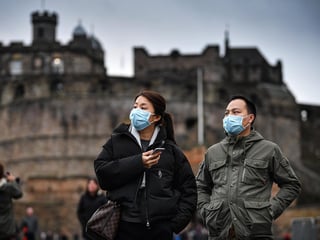How to stay rational about coronavirus in the face of panic – Dr Antonis Kousoulis


The UK is a bit on edge at the moment. Following hot on the heels of Brexit, we’ve seen weather challenges, and a news agenda dominated by the Covid-19 coronavirus outbreak. It’s fair to say public health and climate related emergencies are only likely to become more frequent in the next few years, as environmental and human challenges become more pressing.
In the case of the coronavirus, we don’t know yet what will happen.
Advertisement
Hide AdAdvertisement
Hide AdThe very best scientists in the world are studying the virus and its impact, and responding appropriately with containment, treatment and advice. We don’t know what that will mean for the UK and the wider world - how the disease will develop, whether it will spread and what the implications will be for our ability to stay healthy, to work, to visit people and to move around freely.
Uncertainty breeds concern – and several mental health helplines are getting calls about the virus. We worry about change, and about things we can’t control. There is a lot of information and advice out there, some good, and some bad. It is changing all the time, and there is a lot of fake news around. Even health organisations have often taken a very top-down approach with patronising messaging about what people should or should not be doing, instead of properly engaging with the communities that are facing the real stresses.
The situation may feel scary but panic and stress can cloud our judgement and lead to bad decisions for our health. There are things that you can do to stay mentally healthy.
We need to avoid speculation and look up reputable sources on the outbreak. Rumour and speculation fuel anxiety. Some diseases, such as bird-flu, did not develop at all. And not every cold or cough is the coronavirus. Having access to good quality and up-to-date information about the virus can help us feel more in control. You can get up-to-date information and advice on the virus from the NHS, Gov.uk, Health Protection Scotland and Public Health Wales.
Find a balance
We should all be following hygiene advice such as washing hands often, particularly after using public transport or after being in public places, using tissues if you sneeze or cough and disposing of them, and staying at home if you are feeling unwell.
Not everything you see or hear is going to be true. If you find that the news is stressing you out, it’s important to find a balance. It’s best that you don’t avoid all news and that you keep informing and educating yourself, but limit your news intake if it is bothering you. You might want to mute or turn off news notifications or your smartphone or limit your news intake to once a day.
At times of stress, we usually work better in company and with support. It is normal to feel vulnerable and overwhelmed as we consume news about the outbreak, especially if we have experienced trauma or a mental health problem in the past. It’s important to acknowledge these feelings and remind each other to look after our physical and mental health, and avoid increasing habits that are not helpful, like smoking and drinking.
Try and keep in touch with your friends and family or contact a helpline for emotional support. You may also like to focus on the things you can do if you feel able to: use stress management and relaxation techniques, keep active and eat a balanced diet.
Rumours at school
Advertisement
Hide AdAdvertisement
Hide AdOur response to infectious outbreaks, like in mental ill-health, has a history of discriminating against the most vulnerable. It’s really important not to judge people and avoid jumping to conclusions about who is responsible for the spread of the disease. The novel coronavirus can affect anyone regardless of gender, ethnicity or sex. Being caring and supportive improves the chances of prevention and recovery.
Talk to your children and your family and reassure anyone you know who is worried. Involving family and children in plans for mental health is essential. We need to ask children what they have heard about the outbreak and support them. They could have picked up rumours at school. Don’t avoid the “scary topic” but engage in a way that is understandable to them. We have more advice on talking with your children about world news.
All around the world, there are epidemiologists and public health doctors whose job it is to look out for patterns in disease. But as the news cycle has become 24-hour, and our connection to distant world events more and more immediate, there is a very real risk that real, but small threats become hyper magnified in our minds before we have the chance to work out how concerned we should actually be.
The critical thing for our mental health is that we gain appropriate perspective and context – without cutting ourselves off from important public health advice.
It may be that the coronavirus outbreak burns out. It may join the other four human coronaviruses as a condition which appears and disappears from time to time – or it may become a global threat to public health. Whether it is this agent, or another, there will come a time when we need to be able to receive and respond to urgent public health advice. That includes making sure that we are in our best mental health to be able to act rationally when required.
Dr Antonis Kousoulis is a director at the Mental Health Foundation, a medical doctor specialist in public health and a visiting lecturer at the London School of Hygiene & Tropical Medicine
